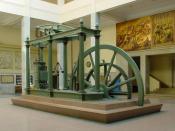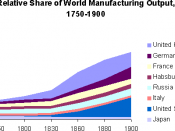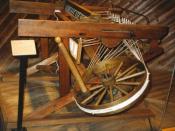The Industrial Revolution
The Industrial Revolution was a time of drastic and transformation from hand tools, and hand made items to machine manufactured and mass-produced goods. This change generally helped life, but also hindered it as well. Pollution, such as CO2 levels in the atmosphere rose, working conditions declined, and the number of women and children working increased. The government, the arts, literature, music, and architecture and man's way of looking at life all changed during the period. Two revolutions took place, both resulting in productive but also dire consequences.
Before the first Industrial Revolution, England's economy was based on its cottage industry, where workers bought raw material from merchants and made their goods at home. It was owned and managed by one or more people, who had a good worker/boss relationship. This was demolished by capitalism. The industry was efficient but the workers, productivity was low, making costs higher.
The longer it took one person to manufacture a product, the higher the price was, and the wealthy people were usually the ones who bought them.
The Industrial Revolution started in England around 1733, with the first cotton mill. A more modern world had begun, as new inventions were being created. Factories followed thereafter. In 1733 British weaver John Kay, saved England's economic crisis by inventing the flying shuttle, which cut weaving time in half. Although, at first, many workers didn't accept machines, many inventions were destroyed. Inventions such as the spinning jenny, cotton gin, spinning mule, and power loom all helped the manufacture of cotton goods b speeding up the process.
The factory system had replaced the cottage industry, where mass production made usually expensive items, such as shoes, less expensive and easily affordable by lower class and less wealthy people. In the 1800's, inventions weren't just limited...


